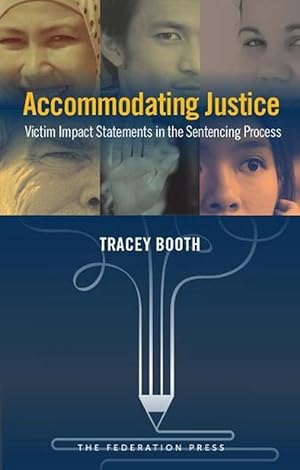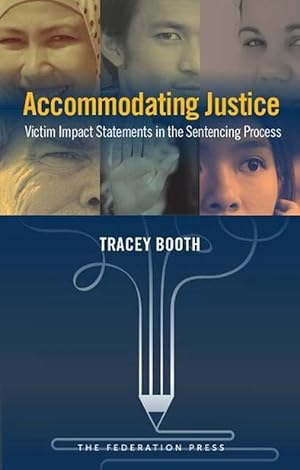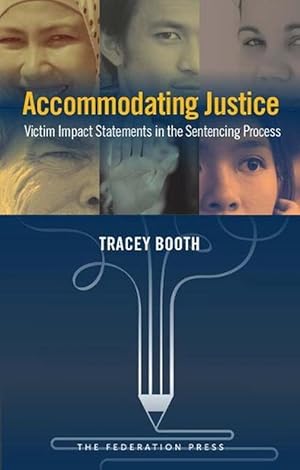9781760020484 - Accommodating Justice: Victim Impact Statements in the Sentencing Process de Booth, Tracey (3 résultats)
Type d'article
- Tous les types d'articles
- Livres (3)
- Magazines & Périodiques
- Bandes dessinées
- Partitions de musique
- Art, Affiches et Gravures
- Photographies
- Cartes
-
Manuscrits &
Papiers anciens
Etat
- Tous
- Neuf
- Ancien ou d'occasion
Reliure
- Toutes
- Couverture rigide
- Couverture souple
Particularités
- Edition originale
- Signé
- Jaquette
- Avec images
- Sans impression à la demande
Pays
Evaluation du vendeur
-
Accommodating Justice (Paperback)
Edité par Federation Press, Annandale, NSW, 2015
ISBN 10 : 1760020486ISBN 13 : 9781760020484
Vendeur : Grand Eagle Retail, Wilmington, DE, Etats-Unis
Livre
Paperback. Etat : new. Paperback. Prominent criminologist David Garland has argued that VISs have led us into unfamiliar territory where the ideological grounds are far from clear and the old assumptions an unreliable guide.\n\nA victim impact statement (VIS) is a highly nuanced and individual narrative that can operate as both an informational device in the sentencing process and an expressive mechanism for crime victims. From the law perspective, VISs provide the court with details of harm caused by the offence and the consequences of the offending in order to further purposes of sentencing. As an expressive mechanism, VISs offer victims the opportunity and space to express their feelings, tell their personal story of the aftermath of crime, and be heard by the court, the offender, and the wider community.\n\nThough a well-established feature of contemporary sentencing hearings (at least in superior courts) VISs remain controversial in common law jurisdictions. The non-legal nature of VISs has generated uncertainty in relation to the functioning of the sentencing hearing and concerns have been raised that VISs are: inconsistent with established legal values, detrimental to the offenders entitlement to a fair hearing, detrimental to victims wellbeing, and harmful to the integrity of the legal proceedings.\n\nAccommodating Justice: Victim Impact Statements in the Sentencing Process explores the complex territory where VISs, the law and legal institutions intersect with a focus on the requirements of fairness, most particularly in the courtroom. And it does so from multiple perspectives: courts, offenders and victims. The book draws from a range of theoretical and doctrinal sources as well as empirical studies from Australia, Canada, the United States and the United Kingdom. An ethnographic study of the performance of VISs in homicide sentencing hearings in the NSW Supreme Court woven through most chapters provides an innovative and evidence-based approach to the issues. This book explores the complex territory where VISs, the law and legal institutions intersect with a focus on the requirements of fairness, most particularly in the courtroom. And it does so from multiple perspectives: courts, offenders and victims. Shipping may be from multiple locations in the US or from the UK, depending on stock availability.
-
Accommodating Justice (Paperback)
Edité par Federation Press, Annandale, NSW, 2015
ISBN 10 : 1760020486ISBN 13 : 9781760020484
Vendeur : AussieBookSeller, Truganina, VIC, Australie
Livre
Paperback. Etat : new. Paperback. Prominent criminologist David Garland has argued that VISs have led us into unfamiliar territory where the ideological grounds are far from clear and the old assumptions an unreliable guide.\n\nA victim impact statement (VIS) is a highly nuanced and individual narrative that can operate as both an informational device in the sentencing process and an expressive mechanism for crime victims. From the law perspective, VISs provide the court with details of harm caused by the offence and the consequences of the offending in order to further purposes of sentencing. As an expressive mechanism, VISs offer victims the opportunity and space to express their feelings, tell their personal story of the aftermath of crime, and be heard by the court, the offender, and the wider community.\n\nThough a well-established feature of contemporary sentencing hearings (at least in superior courts) VISs remain controversial in common law jurisdictions. The non-legal nature of VISs has generated uncertainty in relation to the functioning of the sentencing hearing and concerns have been raised that VISs are: inconsistent with established legal values, detrimental to the offenders entitlement to a fair hearing, detrimental to victims wellbeing, and harmful to the integrity of the legal proceedings.\n\nAccommodating Justice: Victim Impact Statements in the Sentencing Process explores the complex territory where VISs, the law and legal institutions intersect with a focus on the requirements of fairness, most particularly in the courtroom. And it does so from multiple perspectives: courts, offenders and victims. The book draws from a range of theoretical and doctrinal sources as well as empirical studies from Australia, Canada, the United States and the United Kingdom. An ethnographic study of the performance of VISs in homicide sentencing hearings in the NSW Supreme Court woven through most chapters provides an innovative and evidence-based approach to the issues. This book explores the complex territory where VISs, the law and legal institutions intersect with a focus on the requirements of fairness, most particularly in the courtroom. And it does so from multiple perspectives: courts, offenders and victims. Shipping may be from our Sydney, NSW warehouse or from our UK or US warehouse, depending on stock availability.
-
Accommodating Justice (Paperback)
Edité par Federation Press, Annandale, NSW, 2015
ISBN 10 : 1760020486ISBN 13 : 9781760020484
Vendeur : CitiRetail, Stevenage, Royaume-Uni
Livre
Paperback. Etat : new. Paperback. Prominent criminologist David Garland has argued that VISs have led us into unfamiliar territory where the ideological grounds are far from clear and the old assumptions an unreliable guide.\n\nA victim impact statement (VIS) is a highly nuanced and individual narrative that can operate as both an informational device in the sentencing process and an expressive mechanism for crime victims. From the law perspective, VISs provide the court with details of harm caused by the offence and the consequences of the offending in order to further purposes of sentencing. As an expressive mechanism, VISs offer victims the opportunity and space to express their feelings, tell their personal story of the aftermath of crime, and be heard by the court, the offender, and the wider community.\n\nThough a well-established feature of contemporary sentencing hearings (at least in superior courts) VISs remain controversial in common law jurisdictions. The non-legal nature of VISs has generated uncertainty in relation to the functioning of the sentencing hearing and concerns have been raised that VISs are: inconsistent with established legal values, detrimental to the offenders entitlement to a fair hearing, detrimental to victims wellbeing, and harmful to the integrity of the legal proceedings.\n\nAccommodating Justice: Victim Impact Statements in the Sentencing Process explores the complex territory where VISs, the law and legal institutions intersect with a focus on the requirements of fairness, most particularly in the courtroom. And it does so from multiple perspectives: courts, offenders and victims. The book draws from a range of theoretical and doctrinal sources as well as empirical studies from Australia, Canada, the United States and the United Kingdom. An ethnographic study of the performance of VISs in homicide sentencing hearings in the NSW Supreme Court woven through most chapters provides an innovative and evidence-based approach to the issues. This book explores the complex territory where VISs, the law and legal institutions intersect with a focus on the requirements of fairness, most particularly in the courtroom. And it does so from multiple perspectives: courts, offenders and victims. Shipping may be from our UK warehouse or from our Australian or US warehouses, depending on stock availability.




